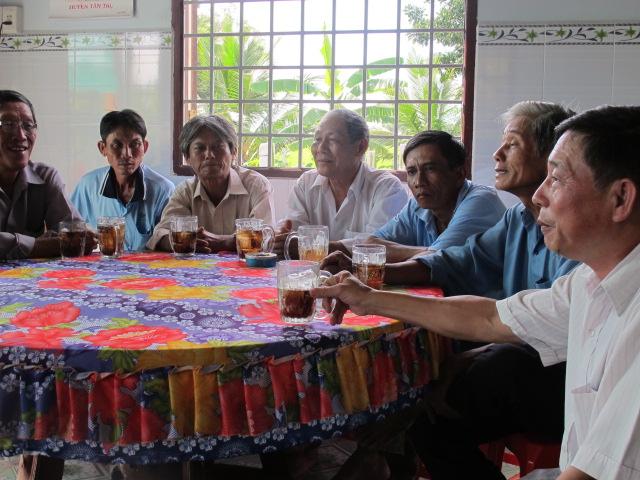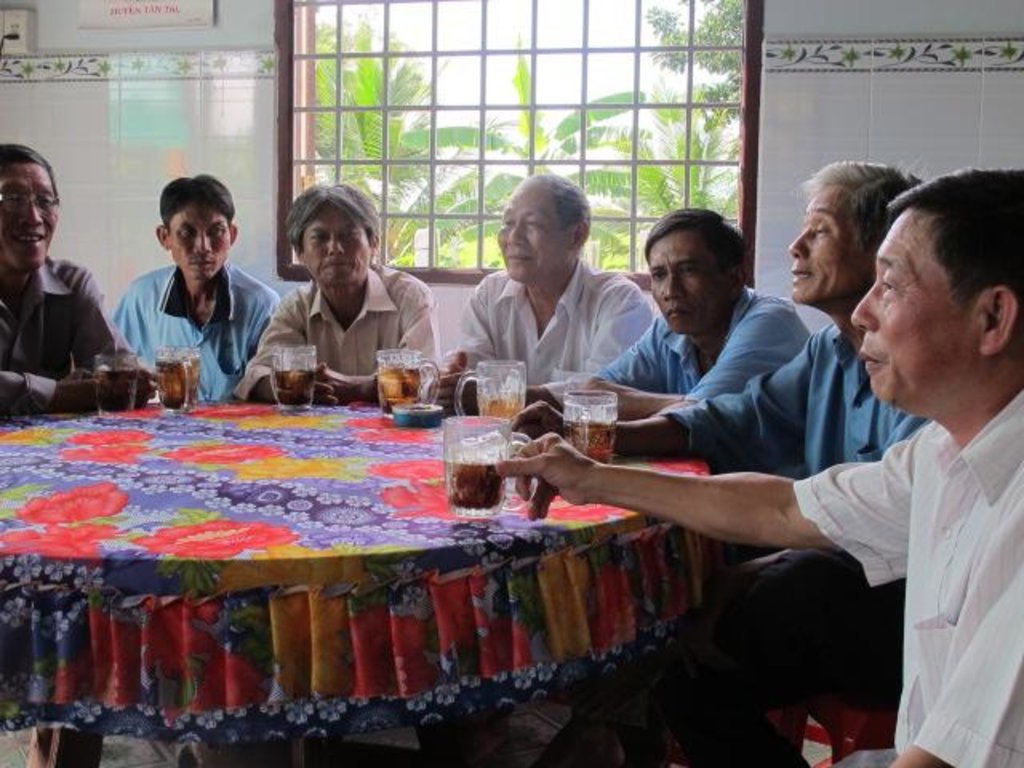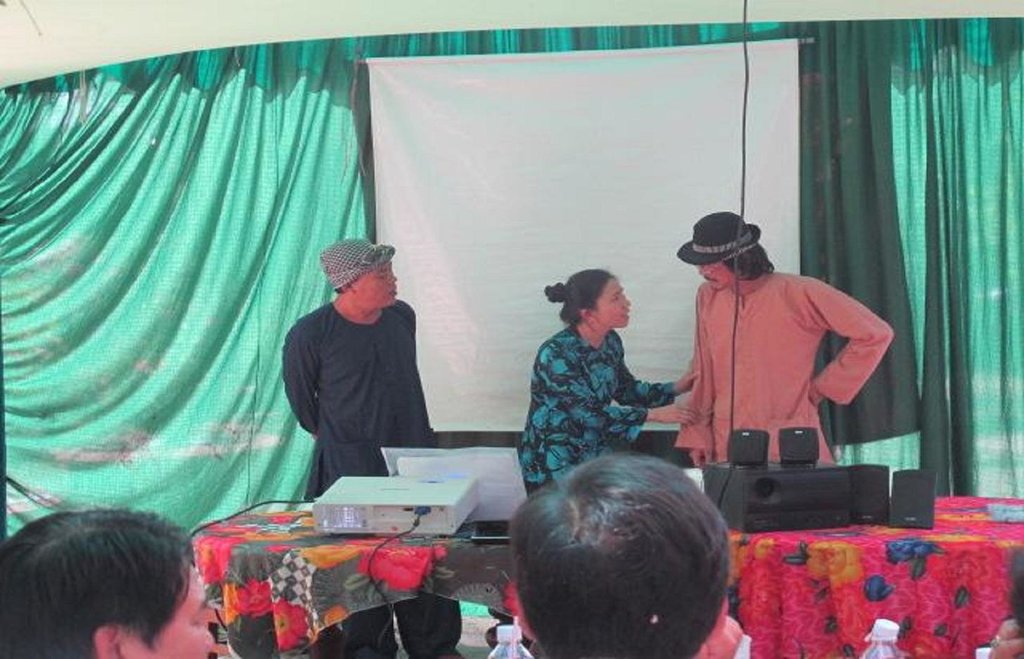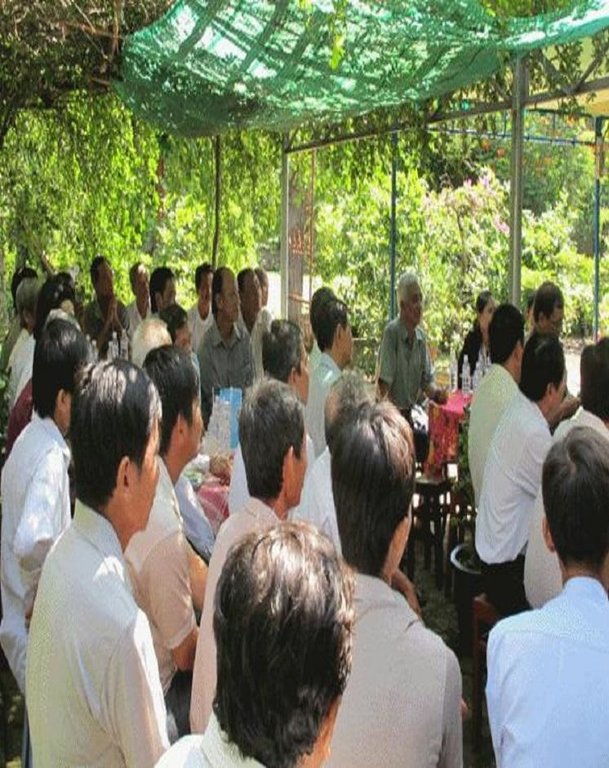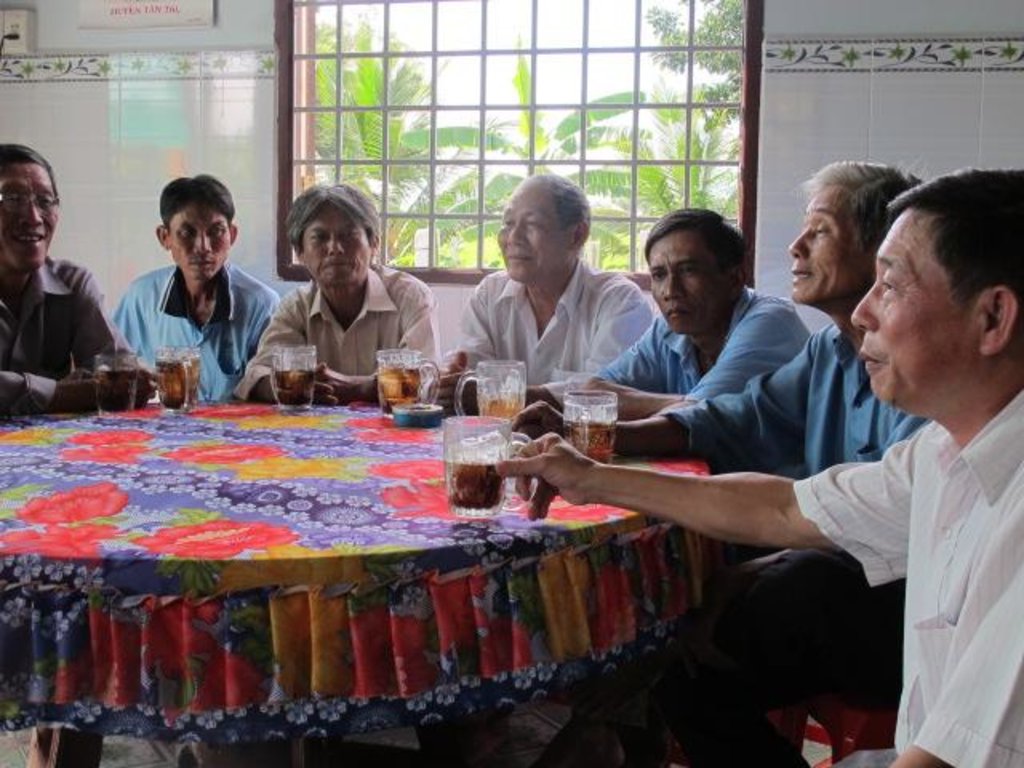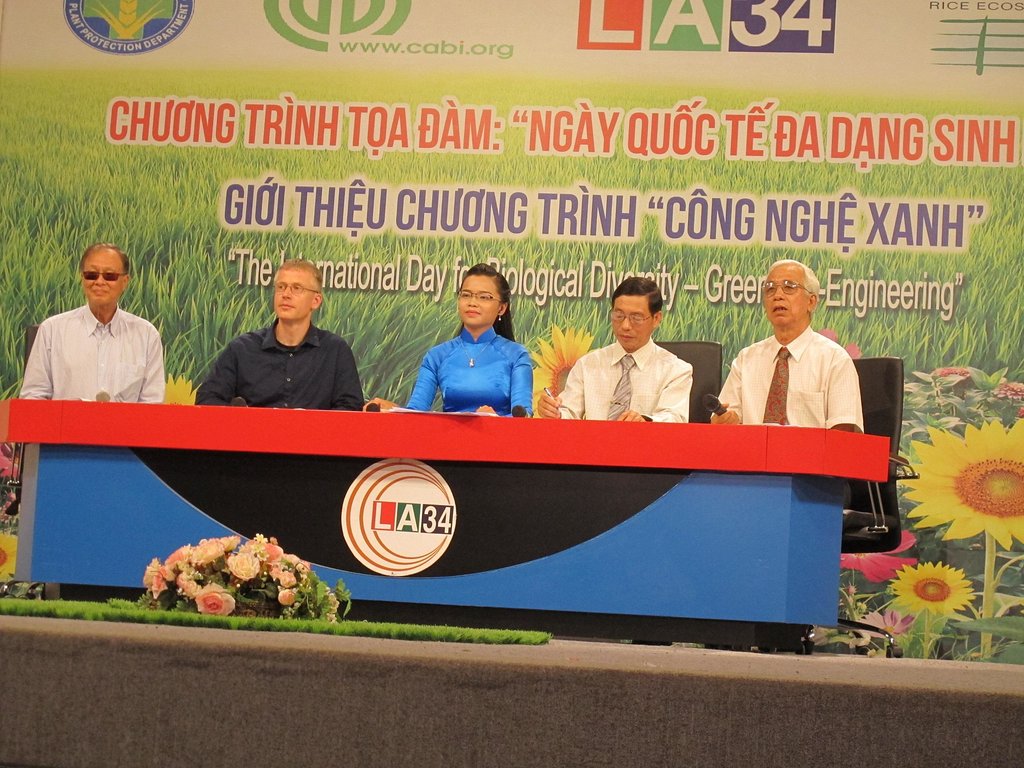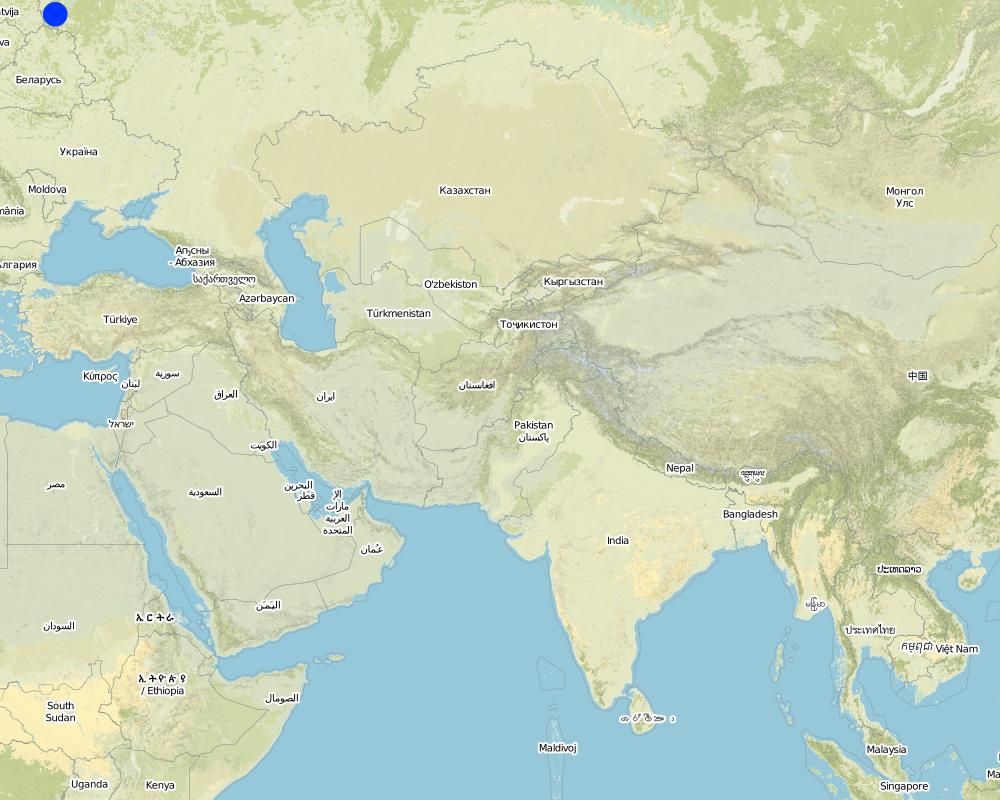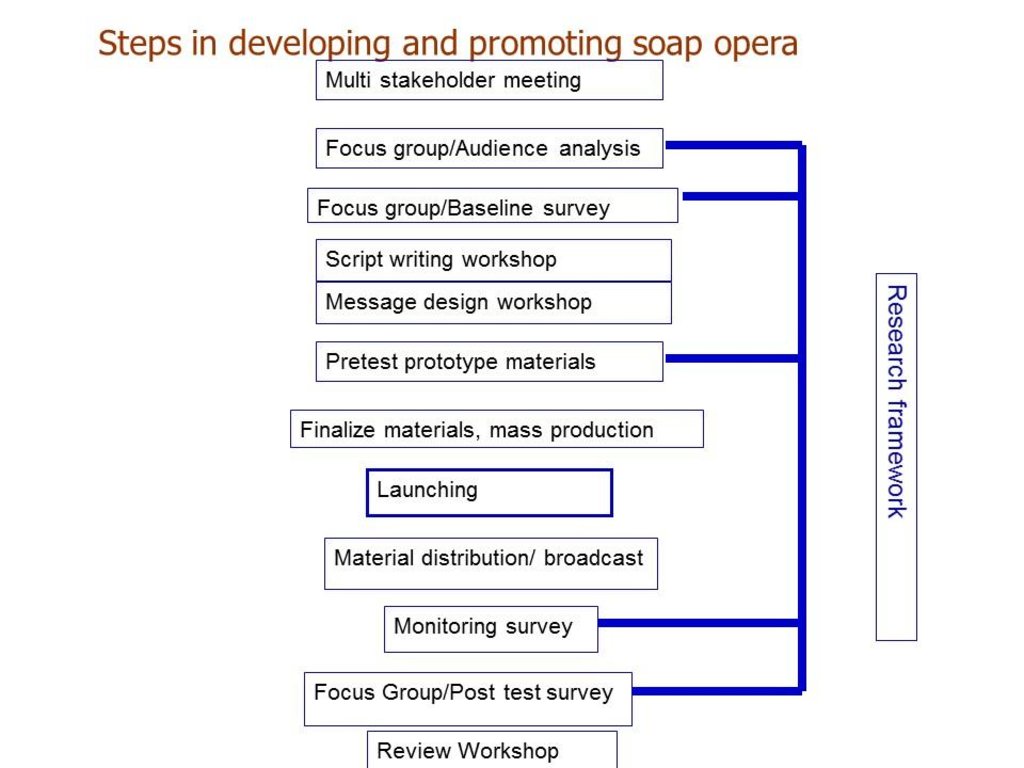Entertainment-education for ecological engineering [Vietnam]
- Creación:
- Actualización:
- Compilador: Monina Escalada
- Editor: –
- Revisor: Fabian Ottiger
Cong Nghe Xanh (Vietnamese)
approaches_2613 - Vietnam
Visualizar secciones
Expandir todo Colapsar todos1. Información general
1.2 Detalles de contacto de las personas de referencia e instituciones involucradas en la evaluación y la documentación del Enfoque
Especialista MST:
Heong Kong Luen
+60 11-3604 7833
kl.heong@gmail.com
Centre for Agricultural BioSciences International (CABI) South East Asia Regional Centre
PO Box 210, 43400 UPM Serdang
Malasia
Especialista MST:
Settele Josef
+49(0)345 558 5320
Josef.Settele@ufz.de
Helmholtz-Zentrum für Umweltforschung GmbH - UFZ
Theodor-Lieser-Straße 4 Halle 06120
Alemania
Nombre de la(s) institución(es) que facilitaron la documentación/ evaluación del Enfoque si fuera relevante)
Visayas State University (VSU) - FilipinasNombre de la(s) institución(es) que facilitaron la documentación/ evaluación del Enfoque si fuera relevante)
Helmholtz Centre for Environmental Research (UFZ) - AlemaniaNombre de la(s) institución(es) que facilitaron la documentación/ evaluación del Enfoque si fuera relevante)
Centre for Agricultural BioSciences International (CABI) - Reino Unido1.3 Condiciones referidas al uso de datos documentados mediante WOCAT
El compilador y la/s persona(s) de referencia claves aceptan las condiciones acerca del uso de los datos documentados mediante WOCAT :
Sí
2. Descripción del Enfoque MST
2.1 Breve descripción del Enfoque
Entertainment-education for ecological engineering involves a series of TV pro-grammes that educate rice farmers about ecosystem services, as well as ecologi-cal engineering techniques to conserve biodiversity in rice landscapes.
2.2 Descripción detallada del Enfoque MST
Descripción detallada del Enfoque MST:
Aims / objectives: A multi-stakeholder participatory process was adopted in formative research, then designing and developing a soap-opera series, launching the programme, followed by implementing on-the-ground support, and monitoring of progress. The stakeholders involved were from research, extension, a video production company and local government. To make sure the educational content was accurately and seamlessly woven into drama, the collaborating team was composed of technical experts and scriptwriters, nicknamed the ‘‘turtles and peacocks’’. Each 15-minute episode is composed of 3 parts: a short drama by comedians, an explanation by experts, and then a summary of the lesson portrayed in that particular episode.
Methods: The LEGATO TV series was produced by Viet Idea, a video company based in Ho Chi Minh City, and was broadcast on Long An TV (LA34) weekly for 20 weeks. The 18 episodes were based on the values grid that LEGATO scientists had developed. They covered a range of topics including organic matter decomposition, organisms and microorganisms, straw burning, rural habitats, the food chain, the architecture of traditional houses, the role of silicon in rice production, honey bees, plant health, eco-tourism and eco-engineering.
Stages of implementation: To popularize and enhance the viewership of the LEGATO Ecological Engineering TV series, a “Meet the Actors Day” was organized in Khanh Hau village, Tan An Town, Long An Province. The organisers comprised “Cong Nghe Xanh”, Long An TV (LA34), Y Tuong Viet (Idea Vietnam), and the Southern Regional Plant Protection Centre. The event was attended by the village People’s Committee Chair, farmers, Long An TV staff and plant protection officers. The “Meet the Actors” day is one of the elements in the entertainment-education approach. To track viewership and audience reactions to the TV series, four focus group discussions (FGDs) were conducted with 41 rice farmers in four villages in Long An province. A post-broadcast survey was carried out in January 2015 among 396 randomly selected rice farmers in Long An and Tien Giang Provinces.
Role of stakeholders: The role of the different stakeholders in the approach was as follows: 1) Farmers provided feedback on the relevance and usefulness of the TV episodes and sug-gested other topics; 2) Plant protection officers worked with TV episode scriptwriters and served as subject matter specialists to simplify the educational content of each episode; 3) Local plant protection experts provided the scientific explanation behind the topics tackled in the episodes; 4) Local government was represented by Dr Nguyen Van Khang, former Director of Agriculture in Tien Giang province who agreed to allocate a portion of the provincial pesticide budget into ecological engineering demonstrations as he required data to be generated locally. Since then, from 2010 to 2014, more demonstration fields were set up.
Other important information: Preliminary analyses showed no significant differences in farmers’ insecticide use, but significant differences were found in beliefs and positions about growing flowers, biocontrol, and silicon use. A follow-up farmer survey was conducted to further eval-uate the effects of the TV series on rice farmers in Tien Giang and Long An Provinces.
2.3 Fotos del Enfoque
2.5 País/ región/ lugares donde el Enfoque fue aplicado
País:
Vietnam
Región/ Estado/ Provincia:
Long An and Tien Giang
Especifique más el lugar :
Tan An town, Tan Tru, Thu Thua, Ben Luc, Chau Thanh,Tan Phuoc, Cai Lay
Map
×2.6 Fechas de inicio y conclusión del Enfoque
Indique año del inicio:
2014
Año de conclusión (si el Enfoque ya no se aplica):
2016
2.7 Tipo de Enfoque
- iniciativa local reciente/ innovadora
2.8 Propósitos/ objetivos principales del Enfoque
The Approach focused on SLM only (reducing insecticide use, restoring biodiversity in rice landscapes )
Improve farmers’ pest management, reduce their insecticide use and improve their land use to include conservation of biodiversity.
The SLM Approach addressed the following problems: Lack of funds to support SLM; Unregulated pesticide marketing continues to negate the gains obtained by SLM.
2.9 Condiciones que facilitan o impiden la implementación de la/s Tecnología/s aplicadas bajo el Enfoque
normas y valores sociales/ culturales/ religiosos
- impiden
Educate farmers to appreciate parasitoids that are too tiny to be seen by the naked eye.
Treatment through the SLM Approach: As the parasitoids and bees belong to the same insect group, hymenoptera, we associated parasitoids with bees that farmers are familiar with.
disponibilidad/ acceso a recursos y servicios financieros
- impiden
Funds to support education system.
Treatment through the SLM Approach: Encourage local governments to provide support.
entorno institucional
- impiden
Lack of direct linkage between agricultural and TV broadcast stations.
Treatment through the SLM Approach: Use stakeholder meetings and field activities to establish these new links.
marco de trabajo legal (tenencia de tierra, derechos de uso de tierra y agua)
- facilitan
The existing land ownership, land use rights / water rights helped a little the approach implementation
conocimiento de MST, acceso a apoyo técnico
- impiden
Technical information.
Treatment through the SLM Approach: Explore research findings for information.
carga de trabajo, disponibilidad de mano de obra
- impiden
Lack of work force dedicated to this entertainment-education process.
Treatment through the SLM Approach: Encourage provincial government to allocate more staff who can simplify and disseminate scientific information.
otros
- impiden
Unregulated pesticide sales continue to erode gains from education.
Treatment through the SLM Approach: Encourage government to review and reform current pesticide sales regulations.
3. Participación y roles de las partes interesadas involucradas
3.1 Partes interesadas involucradas en el Enfoque y sus roles
- usuarios locales de tierras/ comunidades locales
Communication specialist (female), regional director of plant protection (male), ecologist (male)
Farmers, male and female, Vietnamese
- especialistas MST/consejeros agrícolas
Ecologist (male), plant protection director (male)
- investigadores
Visayas State University, Leyte, Philippines
- gobierno local
Local government of Long An province
People's Committee chair (provincial)
- gobierno nacional (planificadores, autoridades)
- organización internacional
Center for Agricultural BioSciences International (CABI), Malaysia
3.2 Involucramiento de los usuarios locales de tierras/ comunidades locales en las distintas fases del Enfoque
| Involucramiento de los usuarios locales de tierras/ comunidades locales | Especifique quién se involucró y describa las actividades | |
|---|---|---|
| iniciación/ motivación | pasivo | SLM promoters |
| planificación | interactivo | All stakeholders |
| implementación | auto-movilización | All stakeholders |
| monitoreo y evaluación | auto-movilización | SLM promoters and local implementers |
| Research | interactivo | SLM promoters |
3.3 Flujograma (si estuviera disponible)
Descripción:
Steps in developing and promoting a soap opera
Autor:
Kong Luen Heong, Monina Escalada (CABI, Kuala Lumpur; Visayas State University)
3.4 La toma de decisiones en la selección de Tecnología(s) MST
Especifique quién decidió la selección de las Tecnología/ Tecnologías a implementarse:
- principalmente por especialistas MST en consulta con usuarios de tierras
Explique:
A stakeholder consultation workshop was organized at the initial stage.
Decisions on the method of implementing the SLM Technology were made by mainly by SLM specialists with consultation of land users. Through stakeholder consultation and focus group discussions
4. Apoyo técnico, fortalecimiento institucional y gestión del conocimiento
4.1 Construcción de capacidades / capacitación
¿Se proporcionó la capacitación a usuarios de tierras/ otras partes interesadas?
Sí
Especifique quién fue capacitado:
- usuarios de tierras
- personal de campo/ consejeros
Forma de capacitación:
- en el contexto de trabajo
- de agricultor a agricultor
- áreas de demostración
- reuniones públicas
Forma de capacitación:
- Communication campaign
Temas avanzados:
Principles of ecological engineering and pest management
4.2 Servicio de asesoría
¿Los usuarios de tierras tienen acceso a un servicio de asesoría?
Sí
- Consultation
4.3 Fortalecimiento institucional (desarrollo institucional)
¿Se establecieron o fortalecieron instituciones mediante el Enfoque?
- no
4.4 Monitoreo y evaluación
¿El monitoreo y la evaluación forman parte del Enfoque?
Sí
Comentarios:
socio-cultural aspects were regular monitored by land users through observations
socio-cultural aspects were regular monitored by land users through measurements
There were no changes in the Approach as a result of monitoring and evaluation
There were no changes in the Technology as a result of monitoring and evaluation
4.5 Investigación
¿La investigación formó parte del Enfoque?
Sí
Especifique los temas:
- ecología
Proporcione detalles adicionales e indique quién hizo la investigación:
Research was carried out on-farm
5. Financiamiento y apoyo material externo
5.1 Presupuesto anual para el componente MST del Enfoque
Si no se conoce el presupuesto anual preciso, indique el rango:
- 10,000-100,000
Comentarios (ej. fuentes principales de financiamiento/ donantes principales):
Approach costs were met by the following donors: international (German Ministry of Education and Research, BMBF (70,000 USD)): 70.0%; government (30,000 USD): 30.0%
5.2 Apoyo financiero/material proporcionado a los usuarios de tierras
¿Los usuarios de tierras recibieron financiamiento/ apoyo material para implementar la Tecnología/ Tecnologías? :
Sí
5.3 Subsidios para insumos específicos (incluyendo mano de obra)
- agrícola
| Especifique qué insumos se subsidiaron | En qué grado | Especifique los subsidios |
|---|---|---|
| Flower seedlings | parcialmente financiado | |
Si la mano de obra de usuarios de tierras fue un insumo sustancial, ¿fue:
- voluntario?
5.4 Crédito
¿Se proporcionó crédito bajo el Enfoque para actividades MST?
No
6. Análisis de impacto y comentarios de conclusión
6.1 Impactos del Enfoque
¿El Enfoque ayudó a los usuarios de tierras a implementar y mantener Tecnologías MST?
- No
- Sí, un poco
- Sí, moderadamente
- Sí, mucho
Reduction in fertilizer and pesticide use
¿El Enfoque empoderó a grupos en desventaja social y económica?
- No
- Sí, un poco
- Sí, moderadamente
- Sí, mucho
¿El Enfoque mejoró cuestiones de tenencia de tierra/ derechos de usuarios que obstaculizaron la implementación de la Tecnologías MST?
- No
- Sí, un poco
- Sí, moderadamente
- Sí, mucho
The problem is likely to be overcome in the near future.
Did other land users / projects adopt the Approach?
- No
- Sí, un poco
- Sí, moderadamente
- Sí, mucho
Did the Approach lead to improved livelihoods / human well-being?
- No
- Sí, un poco
- Sí, moderadamente
- Sí, mucho
Did the Approach help to alleviate poverty?
- No
- Sí, un poco
- Sí, moderadamente
- Sí, mucho
6.2 Motivación principal del usuario de la tierra para implementar MST
- producción incrementada
- incremento de la renta(bilidad), proporción mejorada de costo-beneficio
- conciencia medioambiental
6.3 Sostenibilidad de las actividades del Enfoque
¿Pueden los usuarios de tierras sostener lo que se implementó mediante el Enfoque (sin apoyo externo)?
- incierto
6.4 Fortalezas/ ventajas del Enfoque
| Fuerzas/ ventajas/ oportunidades desde la perspectiva del usuario de la tierra |
|---|
| Our research partners find the use of Entertainment-Education an easy approach to implement as there is often a warm response from the audience - farmers, women's groups and local government officials. |
| Fuerzas/ ventajas/ oportunidades desde la perspectiva del compilador o de otra persona de referencia clave |
|---|
|
The use of entertainment-education approach has been found to be highly successful in Vietnam. An evaluation survey of a radio drama program we launched in 2004, after completion of the program, showed that farmers who had listened to at least two episodes of the program reduced their insecticide sprays by 60%, their fertilizer and seed rates by 9% and 33% respectively (Heong et al., 2008). (How to sustain/ enhance this strength: It can be sustained if there is funding to support the activities.) |
6.5 Debilidades/ desventajas del Enfoque y formas de sobreponerse a ellos
| Debilidades/ desventajas/ riesgos desde la perspectiva del usuario de la tierra | ¿Cómo sobreponerse a ellas? |
|---|---|
| The land users would rely on funding to be able to implement this approach as there is a cost in producing the TV series. |
| Debilidades/ desventajas/ riesgos desde la perspectiva del compilador o de otra persona de referencia clave | ¿Cómo sobreponerse a ellas? |
|---|---|
| An important challenge is the longer-term sustainability of the TV series. The challenge is to mainstream such programs into the TV station’s regular programming. To maintain a long TV series will require funding. A further threat to sustain the gains made by the TV series is “advertising piracy” where the TV series is being used to advertise new pesticides. |
7. Referencias y vínculos
7.1 Métodos/ fuentes de información
- visitas de campo, encuestas de campo
- entrevistas con usuarios de tierras
7.2 Referencias a publicaciones disponibles
Título, autor, año, ISBN:
Westpal, Catrin, Vidal, Stefan, Horgan, Finbarr G., Gurr, Geoff M., Escalada, Monina, Chien, Ho Van, Tscharntke, Teja, Heong, Kong Luen & Settele, Josef. (2015). Promoting multiple ecosystem services with flower strips and participatory approaches in rice production landscapes. Basic and Applied EcologyHeong, K.L., Escalada, M.M., Chien, H.V. and Cuong, L,Q. 2014. Restoration of rice landscape biodiversity by farmers in Vietnam through education and motivation using media. In G. Mainguy (ed) Special issue on large scale restoration of ecosystems. S.A.P.I.E.N.S (online) Vol 7 No. 2. http://sapiens.revues.org/1578. Electronic ISSN 1993-3819Heong, K.L., Escalada, M.M., Huan, N.H., Ky Ba, V.H., Quynh, P.V., Thiet, L.V. and Chien, H.V. 2008. Entertainment-Education and rice pest management: A radio soap opera in Vietnam. Crop Protection, 27: 1392-1397.
¿Dónde se halla disponible? ¿Costo?
Basic and Applied EcologyG. Mainguy (ed) Special issue on large scale restoration of ecosystems. S.A.P.I.E.N.S (online) Vol 7 No. 2. http://sapiens.revues.org/1578. Electronic ISSN 1993-3819 Crop Protection, 27: 1392-1397.
Título, autor, año, ISBN:
Heong, K.L., Escalada, M.M., Chien, H.V. and Cuong, L,Q. 2014. Restoration of rice landscape biodiversity by farmers in Vietnam through education and motivation using media. In G. Mainguy (ed) Special issue on large scale restoration of ecosystems. S.A.P.I.E.N.S (online) Vol 7 No. 2. http://sapiens.revues.org/1578. Electronic ISSN 1993-3819
¿Dónde se halla disponible? ¿Costo?
G. Mainguy (ed) Special issue on large scale restoration of ecosystems. S.A.P.I.E.N.S (online) Vol 7 No. 2. http://sapiens.revues.org/1578. Electronic ISSN 1993-3819
Título, autor, año, ISBN:
Heong, K.L., Escalada, M.M., Huan, N.H., Ky Ba, V.H., Quynh, P.V., Thiet, L.V. and Chien, H.V. 2008. Entertainment-Education and rice pest management: A radio soap opera in Vietnam. Crop Protection, 27: 1392-1397.
¿Dónde se halla disponible? ¿Costo?
Crop Protection, 27: 1392-1397.
Vínculos y módulos
Expandir todo Colapsar todosVínculos
No hay vínculos
Módulos
No se hallaron módulos


